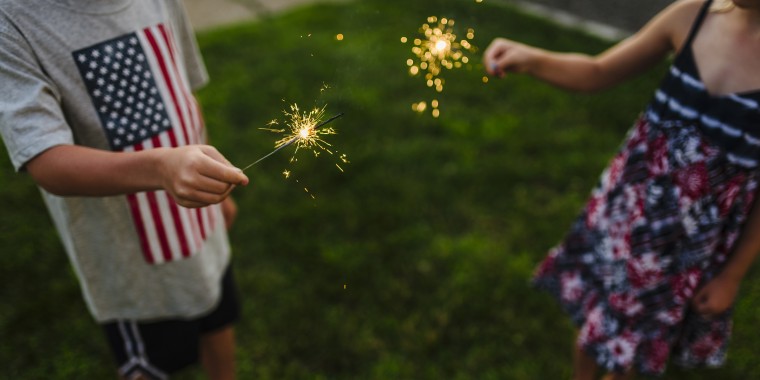In March, President Joe Biden said that the Fourth of July could "begin to mark (the country's) independence" from the coronavirus, thanks to the effective vaccines that are currently available.
"A July Fourth with your loved ones is the goal," Biden said at the time.
Since that statement, the country has fallen short of Biden's goal of partially vaccinating 70% of Americans against the coronavirus, but the White House stressed that it has “succeeded beyond our highest expectations” in getting closer to a pre-pandemic state.
Given the current vaccination rate, the delta variant on the rise and the risk to children under 12 who are still unable to receive a vaccine, what's the safest way to celebrate the Fourth of July?
Dr. May Chu, a clinical epidemiology professor at the Colorado School of Public Health, said that as a public health practitioner, she'd never say an event is "totally safe," but right now, it seems reasonable to "congregate outdoors and have a good time."
"I think a few caveats is that if you're not vaccinated, then you do need to be careful not to be so close (to people) so that you put yourself at risk for being exposed," said Chu, who said that she would still advise unvaccinated people to wear masks when mixing with groups from outside their household. "... In general, the rule of thumb is that it's a green light, with a few considerations."
Other experts agreed that an outdoor event, like a cookout or barbecue, is extremely safe for fully vaccinated people. The more vaccinated people are at an event, the safer it will be.
"If you know for sure that everybody's been vaccinated, I think everyone can be very relaxed about that sort of event," said Dr. Robert Hecht, professor of clinical epidemiology at the Yale School of Public Health in New Haven, Connecticut.
These guidelines change if an event moves indoors: The virus spreads more easily in an indoor, contained setting, so people should be careful about wearing masks and distancing if they aren't vaccinated. Fully vaccinated attendees don't have to worry about masking or distancing.
What about unvaccinated children?
While kids aged 12 to 15 can currently get the two-dose Pfizer-BioNTech vaccine, children under the age of 12 still can't get vaccinated against the virus. Liu said that she would have "a lot more concerns" about indoor activities involving unvaccinated kids.
Children can take their masks off outside, though they should take care to keep some distance between other children. For indoor activities, experts recommend keeping the masks on, at least for now.
Hecht said that one way adults can protect children is by getting vaccinated, noting that in his state of Massachusetts nearly 80% of people over the age of 12 have been vaccinated, leading to a severe drop in cases.
"(Getting vaccinated) gets us further and faster to the end or even the disappearance of COVID, and an even more normal situation," said Hecht.
Are events like parades and fireworks shows safe?
While small parties and gatherings are safe, Dr. Chris Beyrer, professor of epidemiology at the Johns Hopkins Bloomberg School of Public Health, said he would have some concern about large events.
"The CDC guidance is that fully immunized people can get together safely outdoors and engage in sports and activities," he said. "The only concern is when the numbers get really big, and when you start looking at things like outdoor concerts or sporting events that might have thousands of people."
Chu said the safety of large gatherings like parades and fireworks shows is "contextual." She highlighted last summer's protests as an example of the impact that masks can have on transmission.
"If you go look at the different protests in large groupings, outside ... We didn't really have an outbreak or a spike in cases," Chu said, noting that many protesters were masked. "If you're fully vaccinated, you're fine, because you likely are not going to get infected, and if you do get infected you're not going to be really sick. ... The risk is not going to be gone, but the risk is way better than last summer."
Related:
This article was updated on July 2, 2021.




